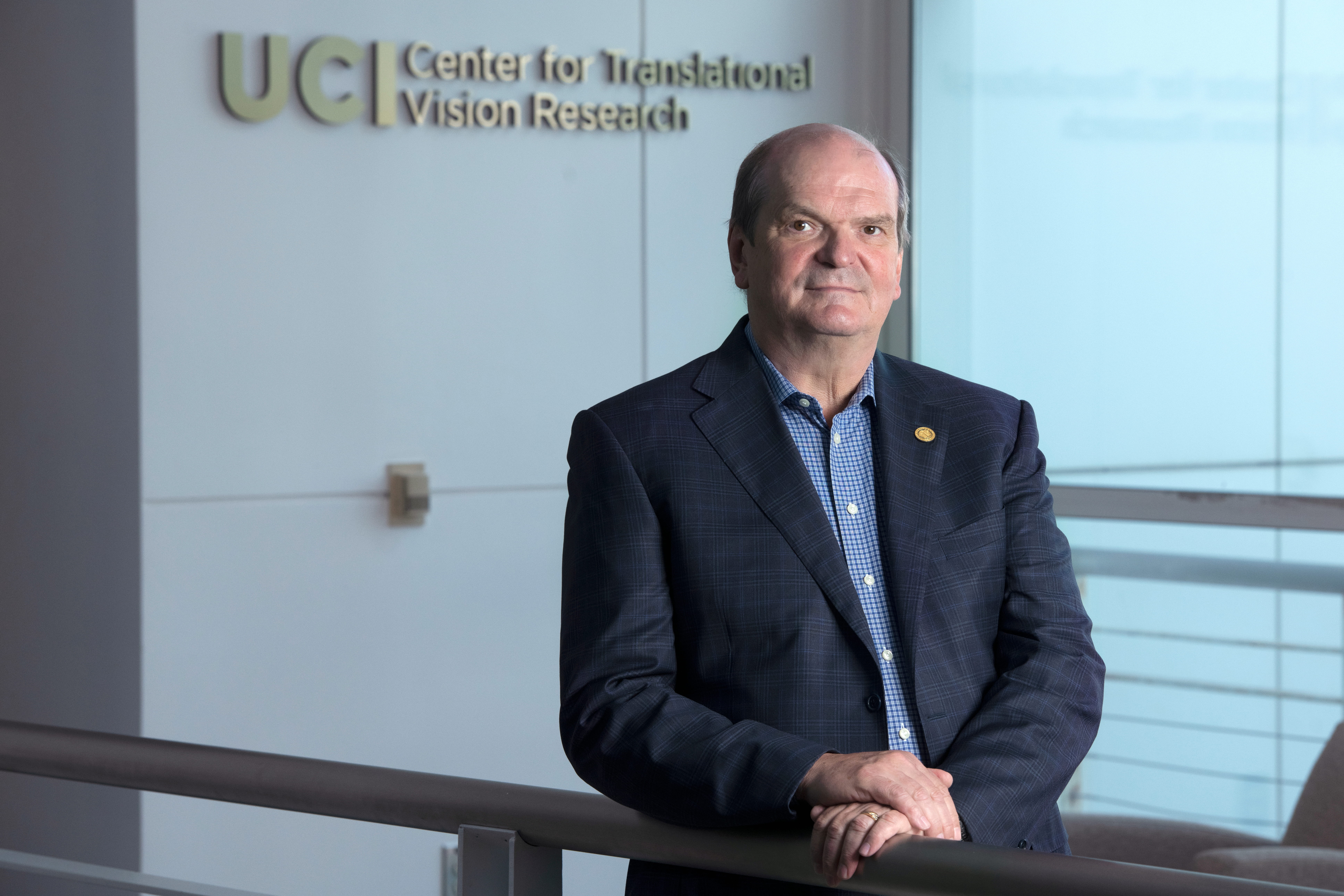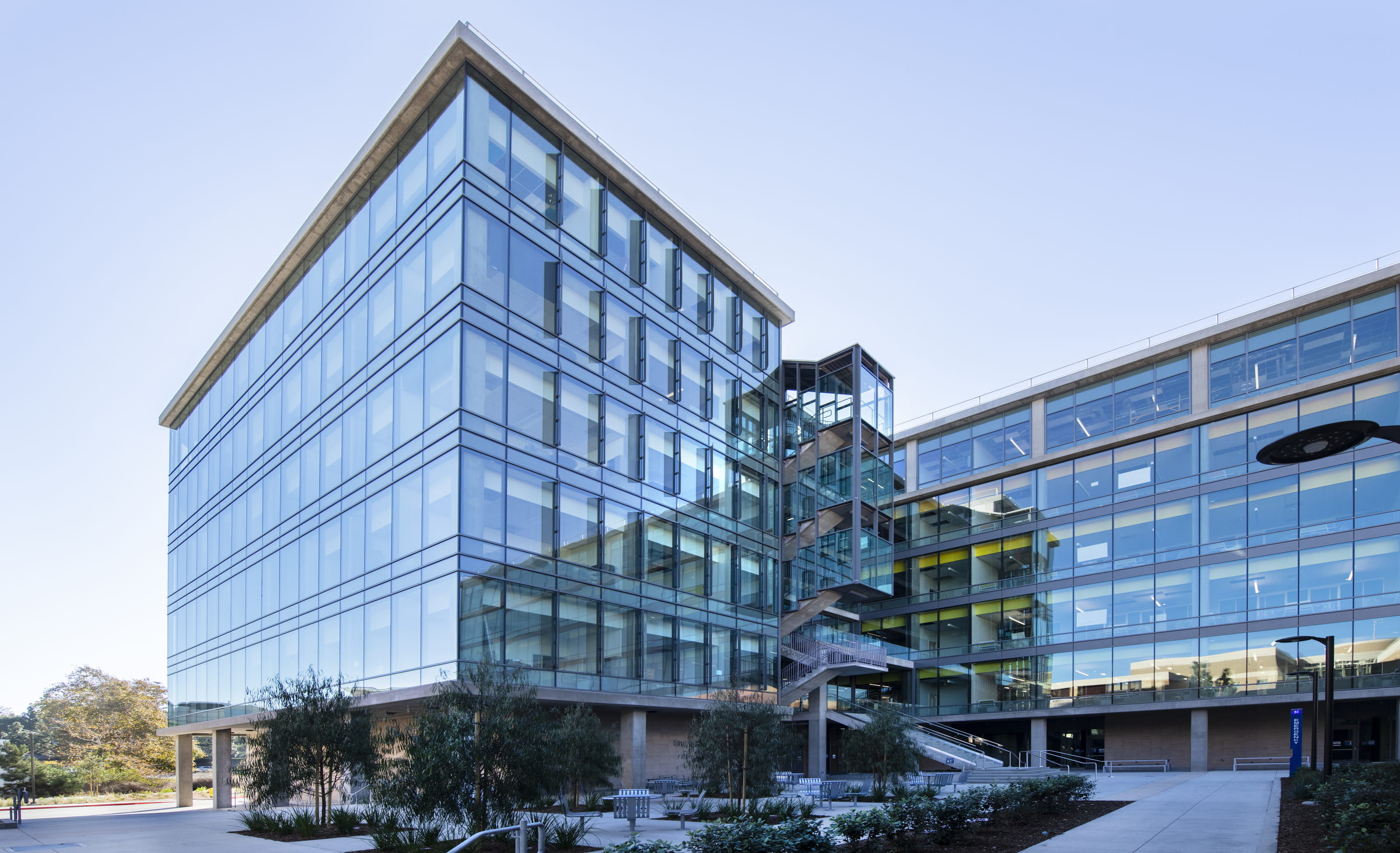Vision visionary
UCI’s acclaimed Donald Bren Professor of Ophthalmology, Kris Palczewski, is blazing a trail of innovative research

Krzysztof “Kris” Palczewski, the Donald Bren Professor of Ophthalmology at UCI’s School of Medicine, admits during the Zoom interview for this story that his mind is elsewhere.
“We have a paper being reviewed right now that should be accepted any time,” he explains. “I am checking every 15 minutes, and I didn’t check in the last 12 minutes while we have been talking.”
Um, should we take a break? “Just kidding,” Palczewski replies. “The paper is with Carol Robinson and has been now accepted for publication in Nature.”
Dame Carol V. Robinson is the first female professor of chemistry at the U.K.’s University of Oxford, where she directs the Kavli Institute for NanoScience Discovery, and is former president of the Royal Society of Chemistry.
The paper produced by Palczewski and Robinson and their research teams will unveil a new methodology for looking at membrane proteins with mass spectrometry.
“It truly is revolutionary work, and it will be published in about four weeks,” he says. “This is about detecting pharmaceutic agents in the body and how well they penetrate the eye, where they reside, and what complexes they are forming.”
Palczewski, who holds 29 issued and nine pending patents, calls the technique “sophisticated” and “extremely novel.”
The Irving H. Leopold Chair in Ophthalmology and director of the Center for Translational Vision Research at UCI’s Gavin Herbert Eye Institute, he was recently named the recipient of the 2022 Louis S. Goodman and Alfred Gilman Award in Receptor Pharmacology by the American Society for Pharmacology and Experimental Therapeutics.
“Dr. Palczewski is receiving this award in recognition of his innovative and pathfinding studies on mechanisms of activation of G protein-coupled receptors that have advanced understanding of receptor structure, signaling mechanisms, defects that lead to disease and treatments that preserve vision,” the ASPET announcement states.
A member of the U.S. National Academy of Medicine and Polish Academy of Arts and Sciences, Palczewski is used to making room on his mantle for prestigious accolades, including the 2018 Paul Kayser International Award in Retina Research from the International Society for Eye Research/Retina Research Foundation, the 2015 Bressler Prize in Vision Science from Lighthouse Guild and the inaugural 2014 Beckman-Argyros Award in Vision Research from the Arnold & Mabel Beckman Foundation.
He’s also one of the very few people to have won both the Cogan Award (1996), for the most promising young vision scientist, and the Friedenwald Award (2014), for continuously outstanding ophthalmology research, from the Association for Research in Vision and Ophthalmology.
His research applies multidisciplinary approaches to the study of phototransduction and the visual cycle to characterize the visual system in health and disease. Pursuit of such a comprehensive understanding of vision, including gene expression and transcriptional regulation, is essential to combat genetic defects, metabolic aberrations and environmental insults leading to blindness.
Palczewski’s work has led to groundbreaking advances in the use of biochemical perturbations for early diagnosis of ocular diseases as well as the stratification of patients for the discovery and validation of pharmacological treatments to forestall or reverse retinal degenerative disorders.
His research has been cited more than 54,000 times, with an H-index impact factor of 121, according to Google Scholar.
Palczewski traces his interest in vision to his school days in his native Poland.
“I was fascinated by the beauty of chemistry in high school,” he says before citing as an example something that may not sound so simple to someone who cut too many chemistry classes in high school: why vitamin A and its derivatives are key nutrients in maintaining healthy bodies and normal vision. In many countries, vitamin A deficiency has led to increased instances of preventable childhood blindness.
“It is extremely simple and extremely elegant and also, by the same token, quite complex,” says Palczewski – who holds a joint appointment in UCI’s Department of Chemistry – of the lesson above. “So, during high school, I knew I wanted to be a scientist, and I knew I wanted to work in vision. Many things happen in our lives that are accidental, but this was not accidental.”
He earned a Ph.D. in biochemistry at Poland’s Technical University of Wroclaw and did postdoctoral training at the University of Florida. Palczewski then started his own lab at Good Samaritan Hospital & Medical Center in Portland, Oregon, where he also served as an assistant professor at Oregon Health Sciences University. He later moved to the University of Washington in Seattle, where in 2000 he published in Science his groundbreaking work on rhodopsin structure, cited by 7,033 publications.
Palczewski’s last stop before coming to UCI three and a half years ago was Ohio’s Case Western Reserve University, where he was a professor in and chair of the Department of Pharmacology, leading it to a ranking within the top nine for National Institutes of Health-awarded funds at U.S. medical schools, according to the Blue Ridge Institute for Medical Research.
Asked what he thinks of UCI so far, Palczewski deadpans, “I have a contract between me and the dean and the chairman that they guarantee we will have the resources to do great research.”
OK then, having spent so many years in Poland, the Pacific Northwest and Cleveland, what does he think of UCI’s climate, given that we were Zooming on an 89-degree day in February?
Palczewski begins his reply by setting the scene for his job interview, which happened during a dinner with the dean and a close friend who’s a biomedical engineer. “My friend took me aside and said, ‘Krzysztof, this is a beautiful place! You go and work! You get to be creative!’ And I think, of course, it’s funny, but it is true. It is less of fighting for life and survival. That’s about geography and place.
“I also think the dean and my chair are extremely supportive. I know how much work it takes. It’s a service for your community, and it’s a service to your faculty. It’s not about boosting your ego. It’s extremely exhausting if you want to do the job well. It’s really a 24-hours-a-day job. You worry about everything, you try to predict what may interfere, and you try to overcome that. So I think coming here enabled me to have a creativity and energy boost and, frankly, to live my life as a dream. This is my dream life.”
If you want to learn more about supporting this or other activities at UCI, please visit the Brilliant Future website at https://brilliantfuture.uci.edu. Publicly launched on October 4, 2019, the Brilliant Future campaign aims to raise awareness and support for UCI. By engaging 75,000 alumni and garnering $2 billion in philanthropic investment, UCI seeks to reach new heights of excellence in student success, health and wellness, research and more. The School of Medicine plays a vital role in the success of the campaign. Learn more by visiting https://brilliantfuture.uci.edu/uci-school-of-medicine/.


